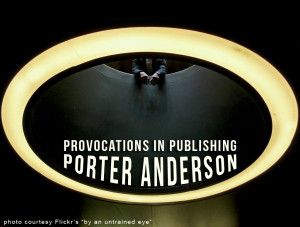Career Cliff Diving
By Porter Anderson (@Porter_Anderson) | September 20, 2019 |

Red Bull Cliff Diving in Bilbao on 13 September 2019 from the Zubizuri near the Guggenheim. Image: #RedBullCliffDiving
Artistry in High Places
As I was headed to the airport in Bilbao a week ago tomorrow to fly to Amsterdam, my taxi driver languidly pointed to the left and said, “Calatrava.”
I looked over at the Zubizuri, as it’s called by the Basques, the “White Bridge” designed by Santiago as a kind of triumphal arch to Frank Gehry’s incredible Bilbao Guggenheim. What a lucky river is the Nervion, I thought to myself, with this soaring bridge and one of the most celebrated art museum designs in the world.
Then the cabby said, “Red Bull.”
“Sorry?” I asked her.
“Red Bull,” she said. “I’ll slow down so you can see.”
They were cliff diving off the Zubizuri in a #RedBullCliffDiving competition that’s now reached the Top 3 countdown for the male competitors in Spain. Gorgeous Basque-country afternoon, massive crowds, spectacular setting, and a lot of clearly experienced drop-dead physiques flying off that bridge, festooned with logos and signage for Red Bull. Here’s the site. View it with caution: You may never get back to your writing.
The competition, which moves to various parts of the world, has been in play since 2009. As one wag running the Red Bull twitter account put it about the Bilbao session last weekend, it reminds you that all art isn’t inside the Guggenheim.
https://twitter.com/cliffdiving/status/1173147156548657152
Screening Up
The reason I found myself spending part of a Friday with near-naked athletes in Bilbao–no complaints about that–is that I was asked to speak to the Union of Basque Writers in a conference expertly organized by Beatriz Celaya. It turns out that the program draws publishers and editors as well as authors (which I like). Planeta was there, as was Penguin Random House Grupo Editorial, the Stockholm-based audio subscription service Storytel, and many more companies and independent writers–a good mix with super questions and comments.
And I wanted you all with me. Because I know that cliff diving is your life, as it is mine. No, actually, I wanted you there because the last time I tried this idea out on you, I got lots of pushback. But I found an author in our audience in Spain who said it all to me this time.
We’d started talking about the “books to film” trend, as it’s called. By coincidence, there’s a significant television festival in nearby San Sebastian each year, and that might have something to do with the writers’ sensitivity to this. But this author explained that he’d taken some courses, done some studying to add a few skills to what annoying human resources people call your toolkit, and he now is juggling the reactions of producers to three TV series for which he’s written television pilots.
“I may end up being a show runner on all three shows, the way it’s looking,” he said.

Red Bull Cliff Diving in Bilbao on 14 September 2019 from the Zubizuri near the Guggenheim. Image: #RedBullCliffDiving
There was a lot of appreciative support for what he’s doing in the room, maybe some envy, too. This is a book author who’s “screening up,” a much more positive development than when White House staffers start “lawyering up,” but something of the same concept: This writer is positioning himself for where the industry is trending.
He made it clear that in some ways he feels as if he’s jumped off a cliff without his Red Bull, but he’s braving it–and liking it. He’s hearing promising noises about his work from production people, getting his legs, learning the ropes, and admitting that it’s changing him as an author in terms of how he works and understands his own creative development.
So I’m here as your friendly provocateur to say this again to you. The successful writers of the future are going to be comfortable in a wider mix of modes. channels, tasks (choose your human resources term) than many authors have been in the past.
Byting the Book in London: Monday Night’s ‘Picture This’

Provocations graphic by Liam Walsh
A couple of days later, a note came over from Justine Solomons, who you may know, the founder of the UK’s Byte The Book industry network for writers, agents, publishers. and suppliers, a proven career-service outfit with a fine track record in London for its change-leading programming that’s responsive to the issues. We in fact had a panel debate about books-to-film with Byte The Book before the opening of London Book Fair two years ago. This is now a maturing, going topic for the organization.
On Monday evening (23 September), the group will gather in Covent Garden for a session called “Picture This: How Can You Write and Adapt for Screen.” They’re producing the session with the Authors’ Licensing and Collecting Society, which collects public-usage fees for authors’ work and pays those fees to the authors.
The main thrust of the evening is a kind of introduction to writing and adapting for the screens, with Jason Solomons, an on-air presenter; author and screenwriter Emma Jane Unsworth; film director Lucy Bryden; film producer Mia Bays; and scriptwriter Shai Hussain.
As much as I know you love me to yammer at you, I thought it might go down better if I asked Solomons to tell us why this very well put-together authors-and-others organization in UK publishing is started to work “screening up” into their program.
Solomons says:
“One of Byte The Book’s primary intentions is to connect writers with other industries that can use their stories. I mentioned the idea of a screenwriting event to ALCS and they were keen to sponsor, as they do a lot to support screenwriters. Writing books is often not that well paid but with the rise of streaming services such as Netflix and Amazon, demand is increasing for original content. Authors, the commercially savvy ones at least, can see how it can help them make money.
“Byte The Book is all about making connections within publishing but also connecting with other industries. It’s about opening the doors to publishing both to a diverse range of authors but also to other businesses that can use stories in innovative ways. We want to support authors and help the think about different ways to make a living from their ideas.”
I’ve chartered a Writer Unboxed plane over to Heathrow for Monday night, holler if you’re in.
Seriously, let’s take another whack at this. I’d like to know from you how ready–or not–you feel to contemplate the idea of “screening up” your career as a writer? Would thinking this way, trying a few moves in that direction, make you a better or lesser author? As always, nobody gets pushed off the bridge for not agreeing with me. But I’d like to know where your head is, here in the era of streaming entertainment and screaming politics: How nimble are you feeling this weekend?

Red Bull Cliff Diving against the Gehry Guggenheim’s iconic exterior in Bilbao on 13 September 2019 from the Zubizuri. Image: #RedBullCliffDiving
[coffee title=”Wish you could buy Porter a glass of Campari?” icon=”glass”]Now, thanks to tinyCoffee and PayPal, you can![/coffee]









Thank you for your post Porter, but to really waste time you need to check out Red Bulls’ Flugtag competitions.
I think there are numerous lessons in screenwriting that have improved my own skills. Books such as Anatomy of a Story, or Creating Unforgettable Characters have been helpful. I also enjoy several YouTube channels that dissect movies for their plots, themes, etc. I’ve even taken some inspiration from the movie Searching (a unique movie that is shown entirely through laptops or phone screens).
While I learn a lot by looking at screenwriting (and wouldn’t be opposed to taking a stab at adapting one of my stories), I have a impractical goal. I’d like to write a novel that couldn’t be adapted into another medium. I consider it impractical because all stories can be adapted with differing levels of success, so what I’m really talking about is how I see the story. Bill Watterson has refused any adaption of his beloved Calvin and Hobbes because he believes it is at its finest in its original form.
Hi, James, thanks for your good comment, and sorry for the lateness of my reply, a busy week.
I wholeheartedly support your idea and intention of creating a book that cannot be adapted into another medium. If this is what you see as a valuable effort, then that’s exactly the endeavor you should make and I’ll be glad to see you succeed.
One of the problems we have in debates these days is that the concept of competition has become so pervasive in our culture that we assume that everyone is trying to “win” and argument and change us in some way.
You’ll be delighted to know, I’m sure, lol, that I have no need to change you, no desire to derail your effort, and would take no pleasure in scuttling your goals. You’ve given me a great reason that, for you, the book is the thing, and you’re gracious enough to concede that there are things to be learned from “the other side,” as it were, which is great.
I meet many writers who have never considered things as clearly as you have. They’re the ones I try to reach out to with some awareness of a business that’s changing in ways you clearly have already perceived and assessed.
So go for it, and thanks again for the response.
-p.
On Twitter: @Porter_Anderson
Thank You for the reply.
Screenwriting is a VERY different form of storytelling. For fiction writers who might wish to try it, understand the differences before you start.
A background in acting, stage or anywhere in the film biz is helpful, but that said I do note that a number of a novelists have successfully “screened up”. (Or is it “down”? Screenplays are shorter than novels, anyway.)
Ha! They are indeed shorter, Don, and thanks for the note.
No question these are highly different forms of work and understanding the differences is indeed important.
At the same time, I want to see our book writers find a place in a world that’s rapidly “screening up” — if they can and if they want to — and there are many who WILL be able to create authentic literature and then be the best people to reinterpret those works for other media. For many others, this won’t work at all, of course, and that’s just fine.
I think it’s good to encourage our writers to at least explore this. I never knew what an affinity I had for journalism — apparently as a natural element of my own form of thinking — until the NYTimes bought a newspaper in a city I was working in as an actor. They came to the rotating repertory house I was with and asked for an actor who could write because they wanted a theater critic who came from the theater. That was my entry into a business I had no idea I could succeed in or even like until that chance to try something completely different but built on the same art I was working in.
Maybe because of that big surprise, which eventually led me to 12 years of criticism and then to hard news in newspapers, television, and Internet media, I’ve got a keen appreciation for people who look around and take in what other ‘nearby media” are doing, in order to see if they might be able to develop their skills and talents to take advantage of the evolution around them.
And I shall respect your right to disagree all the way ot the end of the film. :)
Cheers, Don!
-p.
On Twitter: @Porter_Anderson
I love the idea of screenwriting. I come from an acting background and started out my college days majoring in drama. Even before that, my first for-fun writing I did in high-school was a screenplay I wrote with my sister for the X-Files. (I have no idea where it is, but I’m sure it’s just horrendous.) The first writer’s conference I went to so many odd years ago included screenwriting, and even though I was there to enhance my novel-writing skills, I learned a ton about story development in the screenwriting workshops. I’ve been of the impression that it’s just as tough to break in to and I’m not sure I have the time (both daily with writing and in the long term – I’m an older human being…) to switch gears right now. I wouldn’t even know where to start, truly. But it’s a fun provocation to contemplate on a hot Friday afternoon. :D
Thanks, Lara, and good to hear from you.
I love that open mind in response to the idea.
The only folks who concern me are the ones who reject such ideas as considering embracing “nearby arts” as completely out of hand. As much as all of us here at WU love books and the writing of them, the world we’re in is visual and auditory. I still believe in books. I will always read them. Most of us here will. But most of the rest of the world won’t. And all I want to do is say to writer’s it’s (a) OK and (b) a good idea to just test it out for yourself.
And that’s why I think it’s great that you’ve exposed yourself to some screenwriting workshops — you’re already way ahead of many authors by just having gotten your feet wet. Perfect.
I wouldn’t worry it or force it, either. Just let it float around in your mind and if the time is right at some point, you’ll check it out — maybe just take a local college course on writing film treatments to see what you might do with one of your books, something you could hand to a producer to see if there were any interest or to an agent to see where they could shop it.
Thanks, as ever, and hope you’re well!
-p.
On Twitter: @Porter_Anderson
As Don points out above, scriptwriting is a whole different beast to prose writing, requiring two completely different approaches to a story. There’s no reason a writer can’t do both – Agatha Christie successfully wrote both books and plays, sometimes of the same story but with a different whodunnit – but some writers may find they produce better work if they specialize.
I started out as a scriptwriter because that was what the educational opportunities available were. I’ve seen my work on stage, I’ve seen it in print. I’ve even (briefly, and as part of a student thing) seen it on film.
Mind you, recent feedback on my novel-in-progress included the line “Can’t wait to see this cinematic tale in a movie some day.” So maybe that early training has left its mark, regardless of what I write.
Hey, Deborah,
Thanks for the good note, and I love your thoughts here.
Christie is a great example of someone who did both “stage and page” in her time. And when I was speaking to the publishers and authors I met in Spain, I mentioned Margaret Atwood. Doing all her work in the Hulu series on Handmaid’s Tale hasn’t in some way damaged her as an author — she’s up for a Booker for The Testaments, her new novel.
I really admire authors who are willing to entertain the potential expansion of their reach and range by considering tapping into the energy of the screen industry’s power.
So I wish you well, and thanks again for the note!
-p.
On Twitter: @Porter_Anderson
I’ve done some experimenting with script writing, but my brother is a scriptwriter and teacher of script writing, and from everything I hear, the business is still very much based in LA. It would be hard to get steady work from elsewhere. But could that change in the near future?
Hey, Chris,
Not that your brother isn’t right, I’d say that screen work is a bit better distributed than he’s seeing at this point. A lot of what the major studios do is based in LA but there are strong cities for screen work thanks to the expansion of the independent networks growing as the streamers and subscription houses need more and more content. Toronto is a film city, for example, as are, to varying degrees, Houston, Austin, NYC, Atlanta, Chicago, Seattle, and other spots.
What’s more, in my original thinking on this, what I’m really talking about is authors simply becoming able to work up their own content for producers’ consideration — not necessarily to throw over all else and head into an immersive film-first career, unless they’d like to. (The author I met in Spain had discovered that, in fact, that was what he did want to do.)
Geography means less and less these days. (I’ve worked as a journalist for years for media I’ve never visited physically and often for editors I’ve never laid eyes on.)
Good to hear you’re open to it and thinking about it. Keep that up, the mere awareness will lead you to whatever place you need to be — physically or just in your creativity.
Cheers,
-p.
On Twitter: @Porter_Anderson